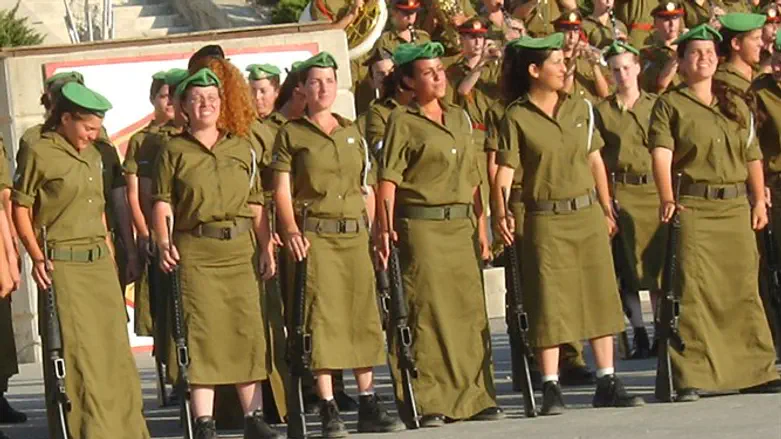
Amital Bareli, director of the Hotam organization (an NGO whose goal is to secure Judaism's position on the public agenda), criticized an IDF report publicized on Army Radio on Sunday morning which claimed that within five years the number of religious girls who enlist in the IDF will be doubled.
According to Bareli, the data presented by the IDF is "laundered." "Not only is this a recycled headline from a year and a half ago, I think there's a new Guinness record here for 2019 in everything related to fake news. Not only is there no increase in the number of religious girls enlisting, but for the first time in five years, there's been a decrease in the trend."
Bareli explained how he claims the system works. "It should be noted that the IDF systematically publishes the data not as a percentage of how many religious girls enlisted but in absolute numbers. The number of girls who enlisted in 2018 is the same as that of girls who enlisted in 2017. That means that the total number of girls did not grow at all, but what did grow is the number of girls in state-religious schools. If you look at the number of girls who enlist from state-religious schools, then you see that there's a slight drop in the percentage of girls enlisting, so these bombastic headlines are unprecedented fake news."
The Knesset Research and Information Center published a report about a year and a half ago that raises serious questions about the data published by the IDF, Bareli says: "The report compared the data that the army published over the years with other data from different frameworks and determined that there was a recycling of the data, that is to say, they laundered the data and changed it according to the needs of the IDF," Bareli asserted. "This is an unequivocal statement by the Knesset Research and Information Center. Simply put, the IDF - instead of providing us with objective data - has become the largest public relations agency in the country, conveniently ignoring data to promote its agendas."
"I will give a very simple example which the Knesset Research and Information Center brings - the manner in which the IDF defines the very simple definition of a religious girl," Bareli says. "In the past, the criterion was very simple, and anyone who was a graduate of a state-religious school fit into the definition of a religious girl. The IDF changed the method and determined that even a girl who is not a graduate of a state-religious school would be categorized as a religious girl. In other words, even a secular girl who announced during her military service for all kinds of reasons that she was religious, such as she didn't want to train on Jewish fast days, would be categorized as a religious girl."
Despite his harsh criticism of the IDF's conduct, Rabbi Bareli remains optimistic: "It's very difficult to accept that the IDF plays with the data. It seems that its goal is to re-educate the National Religious public. I think that we should give a lot of credit and appreciation to the religious girls who aren't impressed by these ongoing campaigns, in which huge sums have been invested. Ultimately, the IDF sees that the girls vote with their feet and serve in the National Service instead."